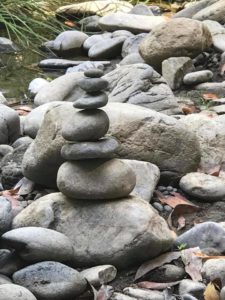
The pubic conversation around grief and loss has been improving in recent months. Rather than the usual practice of avoiding the topic of death and other losses, we seem to be recognizing that there is such a thing as grief and as community members we grapple with how to respond. With all the reports of large-scale tragedies, we may be at risk for experiencing compassion fatigue as we are glued to frequent TV and radio reports. Our hearts go out to children torn from their parents by actions of our own government, to families victimized by floods, fires, and hurricanes, by killings; in the hands of police, neighborhood teens, or a former co-worker or fellow student. We offer condolences on social media, we hold public vigils, write to our governmental representatives, and participate in demonstrations to right the wrongs done to people by forces not in their control.
These are all healthy ways to grieve and we need to note the unhealthy ones. [bctt tweet=”When people do not grieve well, they often create havoc in their own lives and in the public arena as well. ” username=”@SheilaKCollins”]When we experience traumatic loss, or secondary trauma as we observe it in others, we are at risk for deep depression that causes us to isolate from loved ones and despair, or to lash out in vengeful rage at individuals and organizations that we perceive as responsible for the loss.
As an expert on grief and loss I’ve seen this happen in families – a fight over who gets grandmother’s lamp, or perceived inequities in Father’s will, result in siblings never speaking to one another again after the loss of a beloved family member. When a child dies, the different rhythms of the parents’ grieving may drive them apart and they lose their marriage as well. The revengeful “eye for an eye” that starts many wars could be seen as a dysfunctional way to grieve. As Gandhi suggested, “An eye for an eye will make the whole world blind.”
In relation to large scale events, I haven’t done a thorough analysis yet, but if you think back to a few of the most recent school and workplace shootings, we see a perpetrator attempting to even the score regarding something he feels he’s lost – a job, a reputation, a girl friend, a possession he feels rightly belongs to him. And these actions done in rage take innocent bystanders with them.
Sometimes an “ism”, immersed inside the perpetrator’s grief stricken brain creates a misperception of the loss – how dare the girl choose another boy over him? Or why are people not standing aside to allow me my expected rightful place in society?
[bctt tweet=”The current extreme divisiveness in our society is related to how people are dealing with the grief of not getting their way” username=”@SheilaKCollins”]. Whether your candidate loses, or the values you’ve believed in all your life are under attack, as mine seem to be, let’s recognize the importance of honoring the power of our anger while we are expressing it. Practicing this response to our grief encourages us to take purposeful action to bring a good out of something tragic, to change our world in such a way that such injustice and sorrow is less likely to occur again in someone else’s life.

